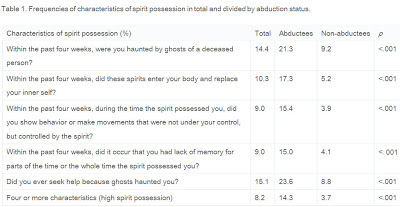Neuroscience

The Lord's Resistance Army (LRA) has waged a long and brutal campaign to overthrow the government of Uganda. Rape and torture are commonly used tactics. Children are kidnapped and forced to serve as soldiers — children and youth comprise almost 90% of the LRA, according to the UN. These child soldiers experience incredibly high rates of trauma exposure, post-traumatic stress, and depression.
A recent study examined the culturally-specific psychological syndrome of spirit possession in this population (Neuner et al., 2012). Although spirit possession is common in many cultures, the phenomenon investigated here is a local variant called cen, where "the ghost of a deceased person visits the affected and replaces his or her identity." It is particularly prevalent in former child soldiers who have killed others. Although some forms of spirit possession are considered relatively benign in Northern Uganda, cen is seen as harmful.
It is important here to consider the complex role of religion and magical belief in motivating and sustaining the LRA (Jackson, 2010), along with socioeconomic and political grievances. The Acholi ethnic group has been depicted as marginalized victims of the Ugandan government by the LRA leader, Joseph Kony. Religion is used as a further means of control (Jackson, 2010):
Furthermore, the Neuner et al., (2012) paper notes that Kony...
With this background in mind, the authors conducted a survey of 1,113 individuals between the ages of 12 and 25 yrs to determine the rates of spirit possession, trauma exposure, and psychological distress. The actual interviewers were members of vivo, an organization that provides psychosocial support to children in Northern Uganda. During a pilot study, the five-item Cen Spirit Possession Scale was developed (shown below).

Notably, a high level of spirit possession (four or more characteristics) was observed in 14.3% of those who were abducted, but only 3.7% of the participants who were not abducted. Girls were more likely to experience cen than boys. In addition, spirit possession was associated with extreme poverty, greater trauma exposure, sexual trauma, and being forced to kill. Most of the youths were treated via traditional means:
Cen led to worse outcomes compared to those without spirit possession, including higher suicide risk, lower functioning, greater perceived discrimination, and higher incidence of PTSD (44.5% vs. 9.8%).2 The authors conclude:
Given the cultural specificity of cen, it might be interesting to consider how Western psychiatry views cases of spirit possession.3 In DSM-IV, this syndrome would be classified as Dissociative Disorder Not Otherwise Specified, with more specific research criteria (but not official diagnosis) fitting Dissociative Trance Disorder (possession trance). Has this changed in DSM-5? We'll take a look in the next post.
Footnotes
1 The New York Times has a fascinating document that details Kony's religious beliefs. He was "possessed" by quite a large number of spirits...
2 See also Remembering and Forgetting in Traumatized Ugandan Refugees.
3 The film industry presents its own flamboyantly supernatural depiction of demon possession for entertainment, as we all know.
References
Jackson P (2010). Politics, Religion and the Lord’s Resistance Army in Northern Uganda. Religions and Development, Working Paper 43. University of Birmingham.
Neuner, F., Pfeiffer, A., Schauer-Kaiser, E., Odenwald, M., Elbert, T., & Ertl, V. (2012). Haunted by ghosts: Prevalence, predictors and outcomes of spirit possession experiences among former child soldiers and war-affected civilians in Northern Uganda. Social Science & Medicine, 75 (3), 548-554 DOI: 10.1016/j.socscimed.2012.03.028
Grace, Milly, Lucy… Child Soldiers (trailer)
- How Two-year-olds Work Out Who Owns What
If you think about it, ownership is a rather slippery concept, one based on all sorts of abstract social and economic principles. Now in one of the first studies of its kind, Ori Friedman and Karen Neary have investigated whether and how two-, three-...
- Possession Trance Disorder Caused By Door-to-door Sales
Some companies and organizations that employ door-to-door sales tactics are known for their cult-like practices (e.g., Amway, traveling magazine sales, and Jehovah's Witnesses). An unusual psychiatric report included this religious brainwashing element...
- Possession Trance Disorder In Dsm-5
American Horror Story: Asylum takes place in 1964 at Briarcliff Manor, a terrifying mental institution for the criminally insane. The show uses every over-the-top stereotype in the book — straightjackets, isolation cells, shock treatment, the chronic...
- Remembering And Forgetting In Traumatized Ugandan Refugees
Gulu, Uganda (vis photography) Most of us have memories from the past that we'd rather forget. When those memories are of a traumatic nature, they can more difficult to expel from our minds. Unwanted memories can be rejected by means of active inhibitory...
- Diagnostic Criteria For Demonic Possession
ABSTRACT: This article addresses the validity of viewing demonic possession as a phenomenon distinct from any other form of pathology. It does so by briefly examining the historical relationship of demon possession and other forms of illness; reviewing...
Neuroscience
Spirit Possession as a Trauma-Related Disorder in Uganda

The Lord's Resistance Army (LRA) has waged a long and brutal campaign to overthrow the government of Uganda. Rape and torture are commonly used tactics. Children are kidnapped and forced to serve as soldiers — children and youth comprise almost 90% of the LRA, according to the UN. These child soldiers experience incredibly high rates of trauma exposure, post-traumatic stress, and depression.
A recent study examined the culturally-specific psychological syndrome of spirit possession in this population (Neuner et al., 2012). Although spirit possession is common in many cultures, the phenomenon investigated here is a local variant called cen, where "the ghost of a deceased person visits the affected and replaces his or her identity." It is particularly prevalent in former child soldiers who have killed others. Although some forms of spirit possession are considered relatively benign in Northern Uganda, cen is seen as harmful.
It is important here to consider the complex role of religion and magical belief in motivating and sustaining the LRA (Jackson, 2010), along with socioeconomic and political grievances. The Acholi ethnic group has been depicted as marginalized victims of the Ugandan government by the LRA leader, Joseph Kony. Religion is used as a further means of control (Jackson, 2010):
The quasi-religious aspects of Kony’s internal cosmology take this sense of victimhood and expand it, through a magpie-like propensity to adopt elements from other belief systems into which he has come into contact. The result is a hotch-potch of beliefs that are used to reinforce the idea that the Acholi are victims and Kony the mystic who can stop protect them. Violence, in this world-view, is conveniently seen as a means of ‘cleansing’ – an evil that is necessary to purify the Acholi so that they can be saved...
Furthermore, the Neuner et al., (2012) paper notes that Kony...
...justified his claim to power by spirit possession and said to have supernatural abilities.1 It is reasonable to assume that this propaganda, which drew on widespread local beliefs, has been a fertile ground for the development of harmful forms of spirit possession in the local population, in particular former child soldiers.
With this background in mind, the authors conducted a survey of 1,113 individuals between the ages of 12 and 25 yrs to determine the rates of spirit possession, trauma exposure, and psychological distress. The actual interviewers were members of vivo, an organization that provides psychosocial support to children in Northern Uganda. During a pilot study, the five-item Cen Spirit Possession Scale was developed (shown below).

-- click on image for a larger view --
Notably, a high level of spirit possession (four or more characteristics) was observed in 14.3% of those who were abducted, but only 3.7% of the participants who were not abducted. Girls were more likely to experience cen than boys. In addition, spirit possession was associated with extreme poverty, greater trauma exposure, sexual trauma, and being forced to kill. Most of the youths were treated via traditional means:
Among those who had ever sought help for spirit possession, 15.2% had carried out the nyono tonggweno ritual (stepping on the egg in a cleansing ceremony), 7.9% mato oput (reconciliation ritual after killing), 7.9% lwoko pik wang (washing away the tears), 31.5% other traditional interventions, mainly taking traditional herbs, and 70.2% sought help at a church or from a priest.
Cen led to worse outcomes compared to those without spirit possession, including higher suicide risk, lower functioning, greater perceived discrimination, and higher incidence of PTSD (44.5% vs. 9.8%).2 The authors conclude:
Although cen was not limited to former child soldiers, they reported higher rates of spirit possession, which may be related to the fact that they were more intensely exposed to the LRA belief system.
At the same time it has to be emphasized that spirit possession is usually not perceived as psychopathology within the local culture. Although our data is consistent with the association of cen with impaired mental health, a reduction of this phenomenon to mere psychopathology is inappropriate. The clinical perspective taken in this survey must be complemented by sociological, historical and anthropological studies investigating the cultural and social interpretation of this phenomenon.
Given the cultural specificity of cen, it might be interesting to consider how Western psychiatry views cases of spirit possession.3 In DSM-IV, this syndrome would be classified as Dissociative Disorder Not Otherwise Specified, with more specific research criteria (but not official diagnosis) fitting Dissociative Trance Disorder (possession trance). Has this changed in DSM-5? We'll take a look in the next post.
Footnotes
1 The New York Times has a fascinating document that details Kony's religious beliefs. He was "possessed" by quite a large number of spirits...
2 See also Remembering and Forgetting in Traumatized Ugandan Refugees.
3 The film industry presents its own flamboyantly supernatural depiction of demon possession for entertainment, as we all know.
References
Jackson P (2010). Politics, Religion and the Lord’s Resistance Army in Northern Uganda. Religions and Development, Working Paper 43. University of Birmingham.
Neuner, F., Pfeiffer, A., Schauer-Kaiser, E., Odenwald, M., Elbert, T., & Ertl, V. (2012). Haunted by ghosts: Prevalence, predictors and outcomes of spirit possession experiences among former child soldiers and war-affected civilians in Northern Uganda. Social Science & Medicine, 75 (3), 548-554 DOI: 10.1016/j.socscimed.2012.03.028
Grace, Milly, Lucy… Child Soldiers (trailer)
- How Two-year-olds Work Out Who Owns What
If you think about it, ownership is a rather slippery concept, one based on all sorts of abstract social and economic principles. Now in one of the first studies of its kind, Ori Friedman and Karen Neary have investigated whether and how two-, three-...
- Possession Trance Disorder Caused By Door-to-door Sales
Some companies and organizations that employ door-to-door sales tactics are known for their cult-like practices (e.g., Amway, traveling magazine sales, and Jehovah's Witnesses). An unusual psychiatric report included this religious brainwashing element...
- Possession Trance Disorder In Dsm-5
American Horror Story: Asylum takes place in 1964 at Briarcliff Manor, a terrifying mental institution for the criminally insane. The show uses every over-the-top stereotype in the book — straightjackets, isolation cells, shock treatment, the chronic...
- Remembering And Forgetting In Traumatized Ugandan Refugees
Gulu, Uganda (vis photography) Most of us have memories from the past that we'd rather forget. When those memories are of a traumatic nature, they can more difficult to expel from our minds. Unwanted memories can be rejected by means of active inhibitory...
- Diagnostic Criteria For Demonic Possession
ABSTRACT: This article addresses the validity of viewing demonic possession as a phenomenon distinct from any other form of pathology. It does so by briefly examining the historical relationship of demon possession and other forms of illness; reviewing...
